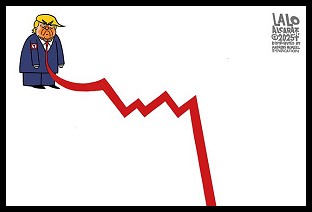John,
Have you seen this article at The LATimes?
**snip**
The administration began skewing federal law enforcement before the current U.S. attorney scandal, says a former Department of Justice lawyer.
By Joseph D. Rich, JOSEPH D. RICH was chief of the voting section in the Justice Department's civil right division from 1999 to 2005. He now works for the Lawyers' Committee for Civil Rights Under Law.
March 29, 2007
"I spent more than 35 years in the department enforcing federal civil rights laws — particularly voting rights. Before leaving in 2005, I worked for attorneys general with dramatically different political philosophies — from John Mitchell to Ed Meese to Janet Reno. Regardless of the administration, the political appointees had respect for the experience and judgment of longtime civil servants.
Under the Bush administration, however, all that changed. Over the last six years, this Justice Department has ignored the advice of its staff and skewed aspects of law enforcement in ways that clearly were intended to influence the outcome of elections."
This is huge! John Conyers pointed it out on his blog!
Sherry
BAD NEWS Regarding Florida Voting...Help Needed
This was from Friday's Sun-Sentinel. Although the governor and the people want reform, these reps are trying to stop it in the budget. I sit in one of these Reps district (Hasner). Anything I can do, let me know.
Republicans vote to ax effort for more money for optical voting scanners
By Anthony Man & Linda Kleindienst
sun-sentinel.com Tallahassee Bureau
Posted March 30 2007, 2:30 PM EDT
TALLAHASSEE --- Republicans in a key Florida House committee voted on Friday to kill an effort to add money to the state budget to pay for optical scanners to replace touch-screen voting machines in 15 Florida counties.
State Reps. Ellyn Bogdanoff, R-Fort Lauderdale; Adam Hasner, R-Boca Raton, and David Rivera, R-Miami, were among those voting against the money, which would help cover the cost of replacing the voting machines in Broward and Palm Beach counties. Bogdanoff and Hasner each represent parts of both counties; Rivera represents parts of Broward and Miami-Dade, which also would get replacement money.
State Rep. Dennis Baxley, R-Ocala, questioned the need to switch voting equipment just a few years after the touch-screen machines were bought. "The fact is that some people don't like the outcome of elections and then question the integrity of the voting system."
Hours later, the House Republicans issued a notice explaining they are not necessarily all that opposed to scrapping the touch-screen machines.
Although they've taken no action on legislation to eliminate the touch-screen machines during the first four weeks of the annual legislative session, shortly after the Republicans voted to eliminate the budget amendment, the party leadership suddenly announced it would allow a hearing on the proposal after all.
Replacing the touch-screen machines with optical scanners that read paper ballots is a top priority of Republican Gov. Charlie Crist. But neither the House nor the Senate has included the $35 million cost in early versions of the state budget.
House Speaker Marco Rubio, R-West Miami, has questioned whether all the state's taxpayers should cover the cost of replacing touch-screen voting machines in just 15 counties that made decisions to buy that equipment. Those counties cover more than half the state's voters.
State Rep. Ari Porth, D-Coral Springs, proposed a budget amendment Friday, asking the House Budget and Policy Council to add $35 million for touch-screen replacement.
"I think our voters are looking for a higher level of integrity. Just because a county screwed up [by buying touch-screen machines] I don't want to penalize the voters in that county," he said.
State Rep. Mary Brandenburg, D-West Palm Beach, supported Porth. "No one can deny there have been problems with elections in Florida. It's important to restore confidence."
The council's Republican members, including several Rubio lieutenants, voted down the Porth proposal. Rivera said voters already have access to paper ballots, and can choose them instead of touch-screen voting, by using absentee ballots through the mail.
 Recent reports that Voting Technologies International has gone out of business have apparently been premature but now the company is being sued by past employees, vendors, and Wisconsin labor regulators, all of whom say the company did not pay them for accrued time off, services rendered and reimbursable expenses. How much longer can it be for VTI?
Recent reports that Voting Technologies International has gone out of business have apparently been premature but now the company is being sued by past employees, vendors, and Wisconsin labor regulators, all of whom say the company did not pay them for accrued time off, services rendered and reimbursable expenses. How much longer can it be for VTI?

 Nation's Largest Broadcaster Mandates News Outlets Hoax Viewers to Help Gut FCC Rules: 'BradCast' 4/23/25
Nation's Largest Broadcaster Mandates News Outlets Hoax Viewers to Help Gut FCC Rules: 'BradCast' 4/23/25 Trump's FCC on Precipice of Ending All Limits on Corporate Control of Local TV Stations
Trump's FCC on Precipice of Ending All Limits on Corporate Control of Local TV Stations GOP Earth Day 2025 Hypocrisies and Dilemmas: 'BradCast' 4/22/25
GOP Earth Day 2025 Hypocrisies and Dilemmas: 'BradCast' 4/22/25 'Green News Report' 4/22/25
'Green News Report' 4/22/25
 Pope Francis Dies,
Pope Francis Dies, Sunday
Sunday  Sunday 'Zero Day' Toons
Sunday 'Zero Day' Toons Soc. Sec. Expert Warns DOGE Hastening Collapse, Privati-zation: 'BradCast' 4/10/2025
Soc. Sec. Expert Warns DOGE Hastening Collapse, Privati-zation: 'BradCast' 4/10/2025 'Green News Report' 4/10/25
'Green News Report' 4/10/25 Trump Blinks, Chaos Reigns, Markets Spike as Many Tariffs Remain Despite 90-Day 'Pause': 'BradCast' 4/9/25
Trump Blinks, Chaos Reigns, Markets Spike as Many Tariffs Remain Despite 90-Day 'Pause': 'BradCast' 4/9/25 SCOTUS Deportation Ruling Grimmer Than First Appears: 'BradCast' 4/8/25
SCOTUS Deportation Ruling Grimmer Than First Appears: 'BradCast' 4/8/25 'Green News Report' 4/8/25
'Green News Report' 4/8/25 Cliff Diving with Donald: 'BradCast' 4/7/25
Cliff Diving with Donald: 'BradCast' 4/7/25 Sunday 'Don't Look Down' Toons
Sunday 'Don't Look Down' Toons 'Green News Report' 4/3/25
'Green News Report' 4/3/25 'Mob Boss' Trump's Trade Sanctions Tank U.S., World Markets: 'BradCast' 4/3/25
'Mob Boss' Trump's Trade Sanctions Tank U.S., World Markets: 'BradCast' 4/3/25 Crawford Landslide in WI; Booker Makes History in U.S. Senate: 'BradCast' 4/2/25
Crawford Landslide in WI; Booker Makes History in U.S. Senate: 'BradCast' 4/2/25 Judge Ends Challenge to GA's Unverifiable, Insecure Vote System: 'BradCast' 4/1/25
Judge Ends Challenge to GA's Unverifiable, Insecure Vote System: 'BradCast' 4/1/25 Bad Court, Election News for Trump is Good News for U.S.: 'BradCast' 3/31
Bad Court, Election News for Trump is Good News for U.S.: 'BradCast' 3/31 Vets Push Back at Plan to Slash Health Care, 80K V.A. Jobs: 'BradCast' 3/27/25
Vets Push Back at Plan to Slash Health Care, 80K V.A. Jobs: 'BradCast' 3/27/25 Signal Scandal Worsens for Trump, GOP; Big Dem Election Wins in PA: 'BradCast' 3/26
Signal Scandal Worsens for Trump, GOP; Big Dem Election Wins in PA: 'BradCast' 3/26 'Emptywheel': Trump NatSec Team Should 'Resign in Disgrace': 'BradCast' 3/25/25
'Emptywheel': Trump NatSec Team Should 'Resign in Disgrace': 'BradCast' 3/25/25 USPS 'Belongs to the People, Not the Billionaires': 'BradCast' 3/24/25
USPS 'Belongs to the People, Not the Billionaires': 'BradCast' 3/24/25
 VA GOP VOTER REG FRAUDSTER OFF HOOK
VA GOP VOTER REG FRAUDSTER OFF HOOK Criminal GOP Voter Registration Fraud Probe Expanding in VA
Criminal GOP Voter Registration Fraud Probe Expanding in VA DOJ PROBE SOUGHT AFTER VA ARREST
DOJ PROBE SOUGHT AFTER VA ARREST Arrest in VA: GOP Voter Reg Scandal Widens
Arrest in VA: GOP Voter Reg Scandal Widens ALL TOGETHER: ROVE, SPROUL, KOCHS, RNC
ALL TOGETHER: ROVE, SPROUL, KOCHS, RNC LATimes: RNC's 'Fired' Sproul Working for Repubs in 'as Many as 30 States'
LATimes: RNC's 'Fired' Sproul Working for Repubs in 'as Many as 30 States' 'Fired' Sproul Group 'Cloned', Still Working for Republicans in At Least 10 States
'Fired' Sproul Group 'Cloned', Still Working for Republicans in At Least 10 States FINALLY: FOX ON GOP REG FRAUD SCANDAL
FINALLY: FOX ON GOP REG FRAUD SCANDAL COLORADO FOLLOWS FLORIDA WITH GOP CRIMINAL INVESTIGATION
COLORADO FOLLOWS FLORIDA WITH GOP CRIMINAL INVESTIGATION CRIMINAL PROBE LAUNCHED INTO GOP VOTER REGISTRATION FRAUD SCANDAL IN FL
CRIMINAL PROBE LAUNCHED INTO GOP VOTER REGISTRATION FRAUD SCANDAL IN FL Brad Breaks PA Photo ID & GOP Registration Fraud Scandal News on Hartmann TV
Brad Breaks PA Photo ID & GOP Registration Fraud Scandal News on Hartmann TV  CAUGHT ON TAPE: COORDINATED NATIONWIDE GOP VOTER REG SCAM
CAUGHT ON TAPE: COORDINATED NATIONWIDE GOP VOTER REG SCAM CRIMINAL ELECTION FRAUD COMPLAINT FILED AGAINST GOP 'FRAUD' FIRM
CRIMINAL ELECTION FRAUD COMPLAINT FILED AGAINST GOP 'FRAUD' FIRM RICK SCOTT GETS ROLLED IN GOP REGISTRATION FRAUD SCANDAL
RICK SCOTT GETS ROLLED IN GOP REGISTRATION FRAUD SCANDAL VIDEO: Brad Breaks GOP Reg Fraud Scandal on Hartmann TV
VIDEO: Brad Breaks GOP Reg Fraud Scandal on Hartmann TV RNC FIRES NATIONAL VOTER REGISTRATION FIRM FOR FRAUD
RNC FIRES NATIONAL VOTER REGISTRATION FIRM FOR FRAUD EXCLUSIVE: Intvw w/ FL Official Who First Discovered GOP Reg Fraud
EXCLUSIVE: Intvw w/ FL Official Who First Discovered GOP Reg Fraud GOP REGISTRATION FRAUD FOUND IN FL
GOP REGISTRATION FRAUD FOUND IN FL


































